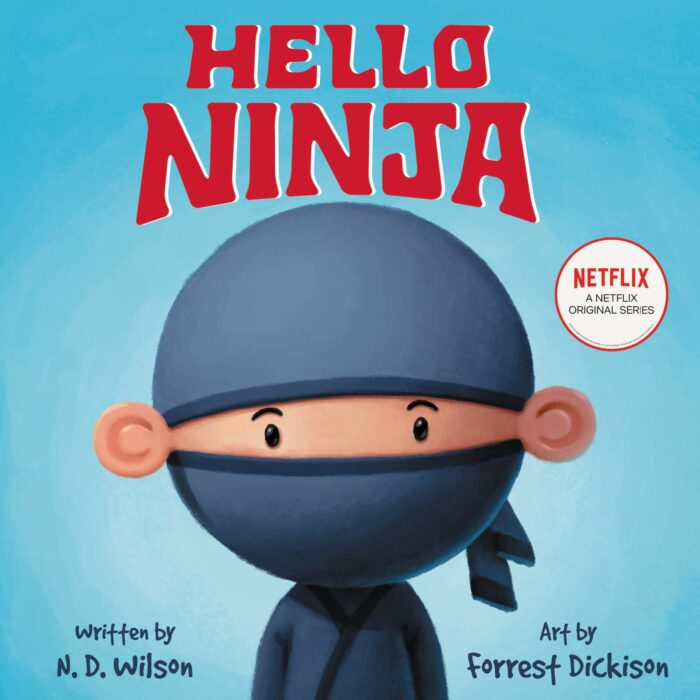When Christians Engage Creative Excellence, Some Secular Critics Will Hate Us Anyway
Ever since Christ came to Earth, his Church has held a tenuous relationship with culture. Christians have balanced on the “being in the world but not of the world” tightrope for generations.
Thankfully, we’ve moved past the era of hand-wringing about “the devil’s music” and issuing edicts against movie-going and video games. Churches now form their own independent film companies and publishing presses. Some host Super Bowl parties and Halloween alternatives, and freely employ pop-cultural iconography for instructional or evangelistic ends. Some Christians call this “plundering the Egyptians” (Exodus 3:20–22), using the world’s resources for God’s kingdom.
But apparently, some of those “Egyptians” are catching onto us.
The Guardian attacks N. D. Wilson and related Christian creators

Sneaky evangelicals, creeping into Netflix like ninjas.
London newspaper The Guardian has been publishing a multi-part exposé of Christ Church, led by Douglas Wilson, in Moscow, Idaho. The Guardian sounds the alarm about this “ultra-conservative church” and its expansionist mission, and openly frets over the idea that “social conservatives aim to gain traction” in society. Even more appalling, these barbarians seek to engage “mainstream popular culture”:
… A new generation of male church leaders – including Wilson’s son [fantasy author N. D. Wilson] – have found ways to expand the church’s reach in Moscow and beyond, even gaining footholds in mainstream popular culture in the broader US.1
By the third installment on Nov. 28, the exposé writer reveals the church’s plan of attack with the sensationalistic headline, “US Christian right group wages culture war with books, cartoon and nature doc.” It seems this church is “seeking to use television and book publishing to enter US popular culture and promote its interests.” Not only that, Christ Church associates are crowdfunding “a creationist nature documentary,” even as they market “young adult fiction through a mainstream publisher” and create the book (and Netflix series) “Hello Ninja!”
Shocking, I know.2
Professing Christians may enable such secular critiques
 The article quotes Kristin Kobes du Mez, professor of history at Calvin University. She also authored Jesus and John Wayne, a critical and rather uncharitable look at the history of evangelicalism and “patriarchy” in the United States.
The article quotes Kristin Kobes du Mez, professor of history at Calvin University. She also authored Jesus and John Wayne, a critical and rather uncharitable look at the history of evangelicalism and “patriarchy” in the United States.
Asked about Wilson’s publishing and media enterprises, Du Mez said:
“Conservative evangelicals have a long history of advancing their religious and political values through popular culture.”
She added that evangelicals produced media for other evangelicals seeking to shield themselves and their families from the “corrupting influences” in secular culture. As a result, Du Mez suggests “it’s always good to follow the money.”
“Since there is a captive market that has been told to distrust ‘secular’ culture, there is a lot of money to be made in producing religious-themed products, particularly those aimed at conservative audiences,” Du Mez concluded.
Du Mez’s critique proves fascinating for several reasons.
First, secularists have spent decades using media to shape and influence mainstream culture. All our major institutions—academia, Hollywood, the arts, Big Tech, social media—are currently held by ideological progressives. When some Christians finally realize that culture’s real power rests with those who control the institutions of culture, this is good for Christians who seek to engage our world.
Nevertheless, Du Mez and The Guardian frame Christ Church’s and other evangelicals’ use of pop culture as a bad thing. For secularist critics, apparently, it’s okay for secularists to use films and books to influence culture. But when conservative Christians attempt the same, the critics raise loud alarms.
Second, notice Du Mez’s implication of a nefarious evangelical scheme: “[I]t’s always good to follow the money. … There is a lot of money to be made in producing religious-themed products, particularly those aimed at conservative audiences.” This sounds ironic, coming from a wildly popular author who has been platformed on many media outlets. Yet no one seriously criticizes Du Mez for making money on her book. However, she and The Guardian assume their readers should be disturbed simply because Wilson’s son made money via secular media, then used that income to fund projects for his church and personal religious outreach.
When Christians ‘plunder’ culture, ‘Egyptians’ lament their losses
This Guardian series looks like a hatchet job on Doug Wilson, N. D. Wilson, and Christ Church. Of course, Doug Wilson is a controversial figure. Many mainstream evangelicals take exception with his beliefs and approach. However, even if you disagree with Wilson’s theology or politics, it’s no controversy for people take their hard-earned money and put it back into their religious community. Nor is it shocking news for churches to invest that money into acts of cultural influence.
The Guardian is highlighting Doug Wilson’s church by design. They clearly want to scare readers into believing that all Christian churches are militant or “ultra-conservative” like Wilson’s church supposedly is.
Such critics also demonize any evangelical cultural engagement. By their beliefs, if Mark Zuckerberg, GLAAD, George Soros, or Planned Parenthood dumps tens of millions of dollars into influencing mainstream culture, we shouldn’t be concerned. But when a Christian church seeks “to use television and book publishing to enter US popular culture and promote its interests,” we should be appalled.
Such lamentations of the plundered Egyptians aren’t unique. The church father Augustine famously suggested that the Jewish exodus from Egypt illustrated more than just a divine prison break. God helped prepare his people to leave enslavement when he told the Israelites to leverage their favor by requesting “silver and gold jewelry, and … clothing” from their Egyptian friends and neighbors.
Augustine said this command is more than a get-rich scheme. To him, “plundering the Egyptians” shows a metaphor for cultural appropriation. Literally.
Augustine suggests the Church in all ages should take good and useful things from pagans and use them for God’s purposes. The Christian need not have copyrights to quote from pagan poets, nor patents to use technology for missional ends. Using wealth, cultural commodities, or intellectual properties, the Church should mine the field of culture for their riches, redeeming them for good ends whenever possible.
Indeed, those Egyptians must have felt infuriated to watch their Israelite neighbors tromp off into the wilderness with the family’s silverware and sphinx bust. But even worse—they may have realized the Israelites would use these very riches to undermine the pagan gods.
Likewise, the Christian church should continue to “wage war,” using “books, cartoons, nature documentaries” or whatever cultural commodities are at our disposal. Drinking the tears of our oppressors is a fitting toast to their plunder.
- “‘Make it a Christian town’: the ultra-conservative church on the rise in Idaho,” Jason Wilson, TheGuardian.com, Nov. 2, 2021. ↩
- Concession stand: Lorehaven has reviewed several novels from Canonball Books, including Brave Ollie Possum, Strays, and The Winter King. ↩

































The final paragraph really says what this is all about: waging war and partying when we win. Sorry, that’s not the kind of church I’m interested in being part of.
I think the first sentence of the last paragraph is completely fitting. I think the last sentence isn’t. I don’t see Jesus celebrating after he flipped the moneychanger’s tables. (I mean, it’s a good line, but it’s not what I see in scripture.)
Happened to be passing through and saw the pushback on Mike Duran’s concluding line.
I figured there might be some pushback. 🙂 To pushback on the pushback, I’d simply ask this:
Is it unbiblical to suggest celebrating over anti-Christian enemies?
Is this suggestion Unbiblical, as opposed to foolish, or merely looking bad in front of certain non-Christians we know or imagine will recoil from such a picture?
If this suggestion is unbiblical, then David and other Psalmists themselves behaved in unbiblical ways, writing—often in very artful and poetic ways—about how God’s people might rejoice when Israel’s enemies get their comeuppance.
But in fact the suggestion by itself is not unbiblical. It might be unwise, in front of certain people we know (or imagine). But if someone says this is sinful, that’s rather a legalistic standard.
I agree with almost the entirety of Duran’s article. In a pluralistic society such as ours, (nearly) every interest group has a right to attempt to influenceculture. Christians have gotten mad at secularists for doing so; and secularists are now mad at Christians for doing so. It seems, like Duran suggests, that secular forces are saying, ‘We can do it because we’re right, but you can’t!’
I haven’t read The Guardian’s articles, but if the quotes above are an accurate picture of the entirety of their reporting, then, yeah, it’s a pretty ironic take.
However, “Drinking the tears of our oppressors…” did throw me at the end. (It’s the only reason why I scrolled down to the comments, lol.) That type of language feeds anti-Christian sentiment.
Just because something occurs in the Bible (e.g., is biblical) does not mean it is right for all people in all times and places. Because David was the leader of what was essentially a theocracy where God = Government, the enemies of David/Israel were the direct enemies of God. Hence, celebrations of the defeat of those enemies was warranted and expected.
The only unmitigated example we have in the Bible is Jesus himself. Just because something is biblical does not mean that it is Christ-like. Jesus’ kingdom (our kingdom) is not of this world. And we shouldn’t engage with this world in a way that Jesus wouldn’t. He never gloated over the failure and silliness of his human enemies. It is, in fact, wise to ‘not gloat when your enemy falls or rejoice when they stumble’ (Prov. 24:17) or drink the tears of our oppressors. (Thinking of secular cultural forces in Western society as oppressors is a stretch anyway.)
Our true rejoicing ought to be in Christ who ‘disarmed the rulers and authorities [those supernatural forces of evil operating against us], and made a public example of them [exhibiting them as captives in His triumphal procession], having triumphed over them through the cross.’
I suppose I agree with you on a technicality: the suggestion to ‘drink the tears of our oppressors’ (such as they are) is biblical. But only because such behavior appears in the Bible, and is engaged in by (imperfect) heroes of our historic religious lineage. But that does not mean it is right or Christ-like in any way.
This is almost absurd in its reductionism.
😂😂😂😂 better give your gold then! Can I have some? 😂😂😂
But for real now I have a few questions if you can and want to engage on them if not well that’s ok love you all my brothers and sisters and let not the world have its way with any of you! God bless you all!
Be happy to field your questions, Dave.
I have bought N.D.Wilson’s books which were fun and Christine Cohen’s Winter King. I will continue to buy future books by them, which her new one is about to release. Canonball has sent their podcasts etc which I haven’t been into. But no one has a problem with secular media attacking our beliefs, pushing their agendas on Christians. Freedom of Speech is for everyone, not just Woke people.
It’s still a war, and I’d never say otherwise. But I’d say that in order to win, love is the only way. No I didn’t grow up in the sixties, and I’m no hippy. But think about Christ. Did he come with a sword? Like some fantasy character like Link from the Legend of Zelda? No. One day he will. But back in the day, he came with his love. Because of his love, he died for us. It’s like in all the stories, a hero laying down his life for the world. Love is what makes a difference. If we show the world our love, not to conquer, but to show how much their Creator cares for them, then and only then, will we make a difference.
There is a battle ahead. The question is, are we ready to give our all? To show what love truly means?
Thank you, Sarah and Daniel. Yes, exactly. I’m seeing way too much “war-waging” rhetoric coming out of purportedly Christian niches of our society, and it conflates rather unfortunately with secular “John Wayne” culture to create something that could end up being truly horrific. Do we really want to launch the American Crusades?
To answer your question, Stephen, “Is it unbiblical to suggest celebrating over anti-Christian enemies?” I would say this:
Who judges who is anti-Christian, and who isn’t?
We war not against flesh and blood…
Scripture is the standard for judging this.
My question, however, remains unanswered.
It’s certainly healthy to challenge Christians who are entirely too chickenhawk-eager for a “culture war.” But when you don’t regard the Bible’s poetic-martial language about God’s people confronting evildoers in some way—not just vague spiritual threats, but actual evildoers—then you are failing to steel-man the opponent’s argument. Furthermore, I daresay we fail to follow such a pietistic standard on our own. Who among us has not celebrated the downfall of an abusive and/or criminal professing evangelical leader? Scripture does encourage some measure of rejoicing when unjust oppressors are defeated. This does influence Christians’ response to worldly oppression, not just in acidic political rhetoric, but even in hymns and Christmas songs.
I think perhaps a distinction could be made here. We should be thankful when evil is pushed back, and even rejoice. I sure am. But here is the thing, what about the person? As mentioned above, our battle isn’t against our fellow humans, but something darker and pervasive. Yes, we all make choices, and we reap what we sow. However, I can’t help but separate the evil and the person. My heart aches when I hear of another Christian leader ensnared by sin. Another battle has been lost. I hope and pray for redemption.
I think I tried to answer your question: no, it’s not unbiblical to suggest celebrating over the downfall of one’s enemies — simply because celebrating over one’s enemies is in the Bible.
However, in the context of Duran’s article, who are we defining as enemies? Secular critics? (If these secularists are important to us simply because they criticize us, then why would we care about their downfall? Let them criticize and let’s see who’s right in the end — if they don’t convert first. And what does that downfall look like? The Guardian refusing to publish their next hit piece?)
Again, in the context of this article, who are the enemies of Christianity? Any publisher or movie/tv production company that does not have explicitly pro-Christian aims? Marvel Studios? Any artist or writer who is not Christian and who tries to influence the world according their views?
Dividing the world into the strict binary of pro-Christian/anti-Christian or religious/secular is imprudent and forces us into the persistent view of the other as enemy, and ourselves as victims.
Also, while there may be the case for some overlap, I don’t think it’s wise to equate, say, a secular film production with rape or racism. If a serial rapist is captured and sent to jail, celebration might be justified. But are we supposed to applaud if House of Gucci bombs at the box office?
And you are right: “we fail to follow such a pietistic standard on our own.” Many people do express glee or celebration over the downfall of a Christian leader who has been secretly doing evil for a long period of time. I’ve seen it a lot among what some would call “progressive Christians” and “exvangelical” believers on social media. I’m not sure if such behavior is right. Just because they do it doesn’t make it right in that or any other case.
Okay, except Doug Wilson is an objectively terrible person. Is Doug Wilson really the hill you wanna die on?
Christians don’t need to ask their permission, approval, or forgiveness. Artistic tools aren’t anyone’s to own in the first place. If gatekeepers of the arts even claim to have moral scruples with it, that’s their personal problem. They don’t hold the keys to the confessional.
Playing by their rules will just mean Christians will just have to keep playing by their rules. And the Church will be hated for its weakness every step of the way.
Jesus Christ is Lord. He was raised from the dead by God, the Father. This means Christ owns everyone and everything in the entire universe. His followers are wise to use each and every platform possible to proclaim the complete and absolute authority of Christ over all the nations. Only God can see the motive. Who am I to question your motives?
f
We are but mere mortals, which means we can only judge by actions.
(cue ominous background music)